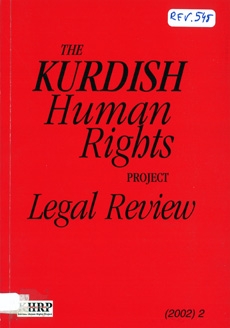|
EDITORIAL
This is the second edition of the new Legal Review, published by the Kurdish Human Rights Project (KHRP). This edition considers the legal developments that have occurred in relation to the Kurdish regions of Turkey, Iraq, Iran, Syria and the Caucasus in 2002.
2002 was a significant year for the development of human rights legislation in the Kurdish regions. Turkey passed a reform package aimed at helping its accession to the EU, including the abolition of the death penalty (except in times of war or imminent threat of war) and the granting of certain cultural rights to Kurds. An illuminating article by Robert Dunbar argues about the real impact of the reform on the rights of Kurdish speakers. The package also abolished the state of emergency in two Kurdish provinces, leaving it remaining only in Diyarbakir and Sirnak, and withdrew its derogation to Article 5 (right to liberty and security) of the European Convention. Less positively, the Council of Europe issued a resolution condemning the actions of the security forces in Turkey, and the Committee for the Prevention of Torture released its most recent report on the continuing allegations of torture and ill-treatment in Turkey’s F-type prisons.
Furthermore, there is the possibility that the very first cases concerning Armenia or Azerbaijan may be brought to the European Court of Human Rights in 2002 or 2003, following their accession to the Council of Europe. In particular, the article on “Compatibility of Armenian Legislation with ECHR Requirements” analyses four main areas of concern on human rights within Armenian legislation (the right to life, the protection against torture, inhuman and degrading treatment or punishment, the right to privacy and family life, and the right to freedom of thought, conscience and religion) in relation with the requirements of the Council of Europe. The Committee for the Prevention of Torture also issued its first ever report on Georgia.
The debate over the 2001 Evaluation Group Report and the future of the European Court of Human Rights continues. KHRP has secured the support of 42 international human rights organisations in its response to the Report, reproduced herein. In a significant development, two judges of the European Court have cited identical concerns in their dissenting judgments to the use of the strikeout procedure in two KHRP cases: Togcu v Turkey (27601/95, 9.4.02) and T.A. v Turkey (26307/95, 9.4.02).
Finally, the possibility of an articulated definition of terrorism by the European Court of Human Rights is analysed by Colin Warbrick in his article, while, on the other hand, Geoffrey Bindman focuses on the role of the International Criminal Court and its effectiveness as a system of international criminal jurisdiction over crimes against humanity.
Kerim Yildiz
Executive Director
Section 1:
Legal Developments in the Kurdish Regions
Compatibility of Armenian Legislation with ECHR Requirements
Armenia became a member of the Council of Europe (CoE) in 2001. Joining the European Council required that Armenia implement certain democratic reforms and take on new legal obligations in the field of human rights. In particular, after accession, Armenia ratified numerous human rights conventions, most notably the European Convention for the Protection of Human Rights and Fundamental Freedoms (ECHR) of 1953 and the European Convention for the Prevention of Torture and Inhuman or Degrading Treatment or Punishment. The Parliamentary Assembly of the CoE also required Armenia to reform its judicial system, adopt a law providing for alternative non-military service, and ensure nondiscrimination in the practice of religion by “non-traditional” religious communities.
This article analyses four areas related to basic human rights in Armenia that deserve particular attention: the right to life, the protection against torture, inhuman and degrading treatment or punishment; the right to privacy and family life, and the right to freedom of thought, conscience and religion. The article attempts to asses whether current Armenian domestic law meets the requirements of the Council of Europe and points out areas where immediate legal reforms are required if Armenia does not want to be found in violation of international law and international obligations. The changes most urgently required are:
- the dejure abolishment of the death penalty;
- implementation of the laws banning forced confessions and maltreatment in places of detention;
- amendments to the Criminal Code decriminalising de jure consensual homosexual relationships between adults;
- clarifications of the relationship between church and state in the Law on Religious Organisations so that an equal treatment of all religious communities is ensured;
- adoption of a Law on Alternative Service providing for alternative non-military service for conscientious objectors;
- strengthening of an independent judiciary;
Armenia's Accession to the Council of Europe
Armenia applied for membership to the Council of Europe in March 1996. The application was considered in light of the enlargement of the Council of Europe. In this respect, the …
| 